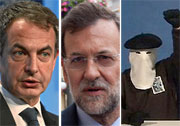 As momentum builds in the lead up to the Spanish general election on November 20th, neither the governing Socialist Party nor the conservative Partido Popular (PP) appears to be softening its stance on talks with the Basque separatist group ETA, which is widely considered to be a terrorist organization. In its election manifesto launched last week, the PP—favored to win the upcoming election—confirmed that it would not negotiate with terrorists.
As momentum builds in the lead up to the Spanish general election on November 20th, neither the governing Socialist Party nor the conservative Partido Popular (PP) appears to be softening its stance on talks with the Basque separatist group ETA, which is widely considered to be a terrorist organization. In its election manifesto launched last week, the PP—favored to win the upcoming election—confirmed that it would not negotiate with terrorists.
ETA, or Euskadi Ta Askatasuna (“Basque Homeland and Freedom”), announced a “definitive” end to its armed activity on October 20th, which both political parties welcomed. But the armed group, and the world leaders that prompted its declaration, also called on the Spanish government to enter into a dialogue with ETA, to address the consequences of the conflict.
Key Conclusions
ETA has broken “permanent” ceasefires before, but this latest declaration has been widely accepted as a definitive end to the armed struggle, partly because the group made its commitment to the international community and did not demand concessions from the Spanish government.
Even if ETA’s terrorist tactics come to an end, it would only be the beginning of a long road towards sustainable peace in Spain. A process that addresses the remaining political conflict could further ensure that violence is taken out of the equation. After all, ETA has yet to disarm; the nationalist cause itself has not diminished; and victims’ needs still have to be addressed. If a new Spanish government refuses to talk to ETA directly, third-party mediators will likely be needed again.
Analysis
After fifty-two years of ETA violence and more than 800 deaths, the Spanish government has good reason not to talk to terrorists. The governing Socialist Party’s last attempt to do so unraveled with ETA’s bombing of Madrid’s Barajas airport in December 2006, which killed two people.
Yet this return to violence also weakened ETA’s support among its own constituency. Members of political parties on the Basque-nationalist left began to realize that ETA’s violence was affecting their gains at the ballot box as well as thwarting their separatist goals. As a result, the so-called Abertzale Left has been instrumental in pressuring ETA to change its tactics, while a government crackdown weakened the latter’s position.
More recently, international mediators have started to play their part, frequently to the disdain of politicians in Madrid. In 2010, South African lawyer Brian Currin initiated the Brussels Declaration that called on ETA to declare a ceasefire, which the group did in September of that year, declaring it “permanent” and “verifiable” last January. Currin then established the International Contact Group for the Basque Country and helped to organize last month’s peace conference.
The talks, attended by world leaders such as former UN Secretary-General Kofi Annan and Irish premier Bertie Ahern, were carefully orchestrated to produce a credible declaration of a definitive cessation of violence by ETA, which followed three days later.
While Spain’s Prime Minister José Luis Rodrígo Zapatero likely condoned the conference (Mr. Annan and Mr. Ahern would not have come without his consent), the conservative PP appears to be a more stalwart opponent of dialogue and of international interference. Recognizing the suffering of victims, the party’s election manifesto explicitly ruled out any measures that would legitimize a terrorist organization like ETA.
But Mr. Currin sees an opportunity for dialogue nonetheless. Among the thorny issues that remain to be addressed—from assistance for victims to the status of ETA prisoners—there are undoubtedly some that will be of interest to any future Spanish government, not least the issue of decommissioning arms. “I would be very surprised if they are not willing to sit and talk about how those consequences are addressed,” Mr. Currin said in an interview with the Global Observatory, “They won’t just go away on their own.”
ETA has broken “permanent” ceasefires before, but part of the reason why this latest declaration has been widely accepted as a definitive end to the armed struggle is that, on this occasion, the group made its commitment to the international community. Previously, the group justified breaking ceasefires by claiming that its opponents in Madrid had not lived up to their side of the bargain.
Third-party mediation could also be a way around the current obstacles to talks. By initially engaging with credible intermediaries rather than directly with ETA, the PP could keep its election promise while also taking the first steps towards a political process that could bring long-term stability and elements of reconciliation to a polarized Spanish society. Electoral politics do not mean that a “genuine opportunity for peace” should be squandered.
Further reading:
Global Observatory interviews with Bertie Ahern and Brian Currin.
Above photo, from left: José Luis Rodríguez Zapatero, Mariano Rajoy, member of ETA




